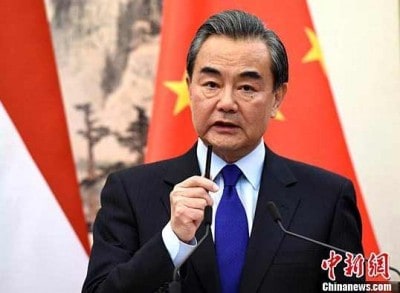By Rahul Kumar
New Delhi, Jan 15 : Chinese Foreign Minister Wang Yi has begun a four-nation trip to Myanmar, Indonesia, Brunei and the Philippines in a bid to strengthen relations with Southeast Asian nations. The visit is to not just rekindle waning interest among nations for the Belt and Road Initiative (BRI) projects but also improve regional relations before the new American government comes to power.
The visit assumes importance because Myanmar occupies a strategic geopolitical location, straddling South Asia and Southeast Asia. It is therefore a country of enormous interest to India, Japan and China’s long-term rival, the US.
For Wang, the paramount concern was to push the China Myanmar Economic Corridor projects, to ensure Myanmar’s structural reliance on Beijing. Deeper connectivity and economic bonds can then be leveraged to expand China’s strategic influence in Myanmar.
To add a “feel good” factor to the visit, Wang launched his four-nation tour from Myanmar by promising three lakh coronavirus vaccines and other pharmaceutical products to support the country in its fight against the pandemic. Wang met Myanmar President U Win Myint and State Counsellor Aung San Suu Kyi in capital Naypyitaw.
But the core driver of the visit was to draw structural connectivity linkages between the strategic deep-water port of Kyakhphyu and the Chinese mainland. Unsurprisingly, China revisited its pet aspirational project extending a railway from the port to its Yunnan province during Wang’s visit.
Ahead of the trip, China and Myanmar agreed to conduct a feasibility study on the Mandalay-Kyaukphyu Railway project, an important segment of the China Myanmar railway plan under the CMEC. The ambitious $20 billion rail project is to connect China’s Yunnan province to the Myanmarese Kyaukphyu port in the Bay of Bengal, allowing China access to the Indian Ocean region bypassing the Malacca strait that links the South China Sea to the Andaman Sea. The railway will run parallel to an oil and gas pipeline that has been already commissioned that will flow energy consignments off-loaded at Kyaukphyu to Yunnan.
The Irrawaddy reports that this infrastructure project has been delayed for nearly a decade due to local objections. Though China projects the CMEC as a development project which will bring riches to its southern neighbour, Myanmarese remain apprehensive. Many feel that this Chinese project could push Myanmar in a debt-trap and even exacerbate conflict in regions where the project passes through.
Wang’s visit is also important as Myanmar has been inching closer to its western neighbour India. Last year, Indian Army chief Gen. Manoj Naravane and Foreign Secretary Harsh Vardhan Shringla had visited Myanmar to bolster border and military cooperation. In December 2020, Myanmar began operating an Indian submarine Sindhugosh, refurbished by India.
The two countries are also flushing out, in joint operations, militants of the Arakan Army on their nearly 1,600 km long border, besides developing the mega Kaladan Multimodal Transit Transport (KMTT) project which connects the Kolkata port to the Myanmarese port of Sittwe.
Wang and Suu Kyi also discussed peace and stability on the border, regional cooperation and China’s role in the repatriation of the Rohingya refugees by mediating between Bangladesh and Myanmar. The two nations also signed agreements for economic and technical cooperation as well as five-year development programme for Myanmar.
Wang’s visit took place at a time when China-Myanmar relations were going south. The China proposed, and environmentally unsound Myitsone dam has stirred public outrage in Myanmar. Wang’s trip to Myanmar is significant also because of the steadily creeping tension between the two neighbours over issues like Chinese support to Myanmarese rebels, the unilateral construction of a high-tech border fence as well as pushing for progress in the CMEC.
Myanmar has reduced Chinese role in the CMEC by either stalling projects or reducing Chinese monopoly by opening up the projects to other countries.mega-dam project has stirred public sentiment against China. Besides, the Myanmarese military has confronted China for supporting the Arakan Army, an insurgent group against the government. So far, Naypyitaw has been reluctant to go ahead with giant China funded projects, to prevent the country from falling in a debt-trap, the hallmark of projects falling under Beijing’s BRI.
With Wang’s visit, China has embarked on a course correction exercise, with the revival of the railway project as the spearhead. But one visit will not be enough to erase the mistrust between the two countries, which has historical roots, especially when key countries, especially India, the US and Japan, part of the Indo-Pacific Quad, have launched their own initiatives, which maybe more appealing to Naypyitaw.
(This content is being carried under an arrangement with indianarrative.com)
Disclaimer: This story is auto-generated from IANS service.

